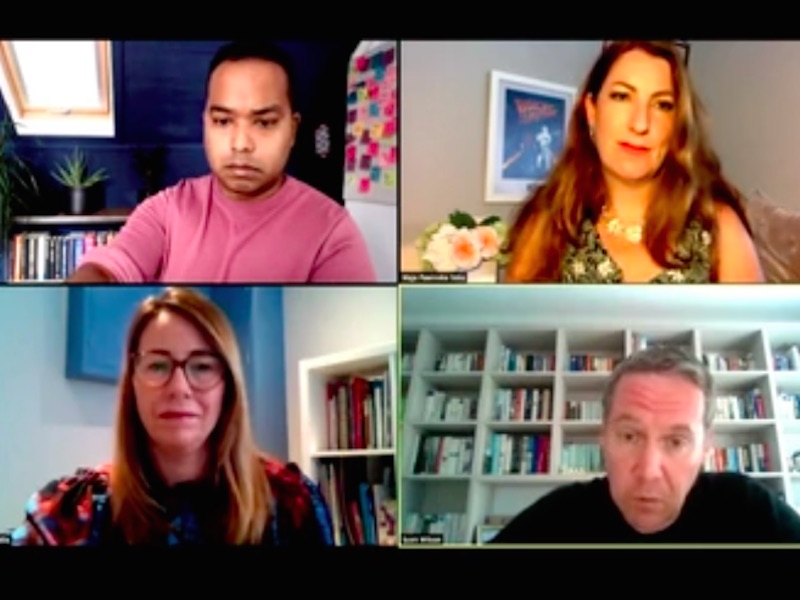Paul Holmes 01 Jul 2020 // 9:38AM GMT

LONDON — Many of the business challenges that agencies experience, from lack of communication to sharing ideas to delegating, can be traced back to cultural issues, Henshall Centre director Liton Ali (pictured, top left) told attendees at the 2020 PRovokeEMEA Summit yesterday.
The session, entitled 'Working From Home in the Time of Covid: Does Company Culture Matter?', was moderated by PRovoke Media’s Maja Pawinska Sims (top right), and began with a discussion of the culture at BCW, formed as a result of the the merger of Burson-Marsteller and Cohn & Wolfe two years ago.
Said Scott Wilson (bottom right), the agency’s president of Europe and Africa, “When you’re merging a company—the largest global startup in our industry—culture is absolutely critical. And you can waste a tremendous amount of time and energy dealing with legacy cultures, which is a road to nowhere. You have to get the new culture right, and build it from scratch.
“One of the most successful things we did was realise that culture is not confined to the HR department or the social committee, but is a boardroom management function, and so we hired a global culture officer as one of the first acts of the merger and then appointed the right people to the culture committee.”
Those people included Catherine Keddie (bottom left), managing director of health at BCW London, and the firm’s first UK chief culture officer, who said: “It started by listening and learning. We had a once-in-a-lifetime opportunity to create a culture from scratch and the first thing was understanding where our people were and how they felt about the merger. That was a huge process of focus groups across the globe, and all sectors and practices, and then using those insights to create a framework and our core belief, which is that the growth of our people would fuel the growth of our clients, which would fuel the growth of our agency.”
The firm now talks about “the line.” When employees are “above the line” they are open, and curious and committed to learning, and so are driving themselves forward. It helps people to see challenges as opportunities. On the other hand, when people are 'below the line" they are closed, defensive, and in survival mode. If that happens, Keddie explained, “change becomes something that happens to us.”
The firm has developed a framework to help people understand when they are “below the line” and tools to help them get back “above the line.” The process is supported by professional development activities and “culture clubs,” as well as a focus on leadership.
Then Covid-19 struck. And, Keddie said, “we were uncannily placed to lean into this growth mindset, despite the epic proportions. It hasn’t been easy but we already had a mindset and a set of tools that really helped us on that journey.”
Discussing the vital importance of culture in general, Ali explained: “The real challenge has always being next to one another, in terms of your own values. Because you come to a company with your own values and your own working style and you have to match those with whatever company you’re working for, so I often come into a company that needs some help solving a problem—performance, for example, or lack of communication, or lack of collaboration—but what I find is there are deeper problems.
“Often those problems go back to recruitment and even where you’re advertising your jobs in the first place, because to build a culture you have to find people who share your values, and so you have to make sure you’re recruiting in the right way, and inducting in the right way. All of those little problems come back to the fact that many companies have not thought hard about building their culture at every little step of the way: hiring and on-boarding and checking in with employees at every level.”
That means leadership, and leading by example, is the most critical element of culture-building. “It’s like an iceberg. There’s what you can see on top, which is visible, the words on the wall. But it’s all the things that are done below the surface, when the doors are closed, that really build a culture. The secret sauce of being open and deliberate and purposeful about the culture. Those ‘hidden bits’ of the culture—how the leaders of the agency behave—that define the culture and sets an example every day.”
As for the impact of coronavirus, which has seen the vast majority of agency employees switch to working from home, “for me, culture matters more than it ever did,” says Ali. “People are no longer being reminded of the agency personality. Culture is infectious, it’s transmitted from person to person. Now that we don’t have that happening naturally, we have to find ways to force that.
“Talking about ‘the line,’ for example, can be very helpful, because there’s a shared language that helps to make the culture concrete.”
Added Keddie, “It’s more critical than ever to reinforce the culture and keep people connected to each other and to the culture. Having that idea of the line embedded in our language has given us a framework to discuss how we’re feeling, how we’re performing, and how we’re growing.”
BCW, she says, has been creating multiple opportunities for people to come together and talk about how they’re feeling, or the challenges clients are facing: "Reinforcing that over and over has been vital to keeping us all connected and keeping our culture alive.”


































.jpg)




.tmb-135x100.jpg)












